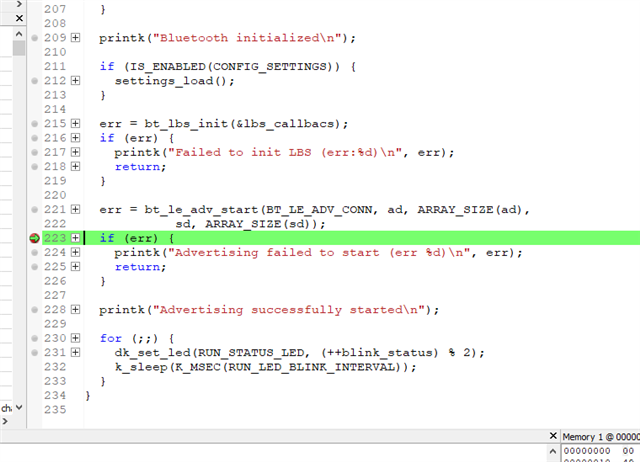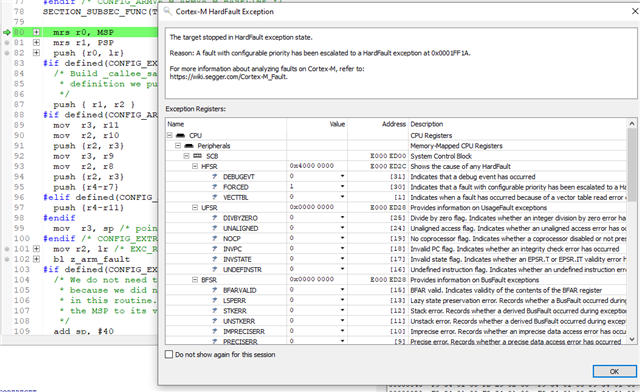Another MPSL ASSERT 112, 2195 instance.
I am experiencing it now regularly usually directly
after servicing my first breakpoint after boot, then continuing.
The next mouse-click of pause after 1st continue, and execution is looping in fatal.c .
(arch_system_halt).
What is causing 112, 2195 ?
(VS-Code/Segger Base/custom pcb nrf52840) // nrf52840 DK BLE Standalone// nrf52840 DK Sniffer//
======================================
(VS-Code/Help/About)
Version: 1.76.0 (user setup)
Commit: 92da9481c0904c6adfe372c12da3b7748d74bdcb
Date: 2023-03-01T10:22:44.506Z
Electron: 19.1.11
Chromium: 102.0.5005.196
Node.js: 16.14.2
V8: 10.2.154.26-electron.0
OS: Windows_NT x64 10.0.22621
Sandboxed: Yes
=======================================
[00:00:30.605,316] <err> mpsl_init: MPSL ASSERT: 112, 2195
[00:00:30.605,346] <err> os: ***** HARD FAULT *****
[00:00:30.605,346] <err> os: Fault escalation (see below)
[00:00:30.605,377] <err> os: ARCH_EXCEPT with reason 3
[00:00:30.605,407] <err> os: r0/a1: 0x00000003 r1/a2: 0x20002c68 r2/a3: 0x20002c68
[00:00:30.605,407] <err> os: r3/a4: 0x00045a9f r12/ip: 0x00000000 r14/lr: 0x000409fd
[00:00:30.605,438] <err> os: xpsr: 0x61000018
[00:00:30.605,438] <err> os: Faulting instruction address (r15/pc): 0x0003a9f4
[00:00:30.605,499] <err> os: >>> ZEPHYR FATAL ERROR 3: Kernel oops on CPU 0
[00:00:30.605,499] <err> os: Fault during interrupt handling
[00:00:30.605,560] <err> os: Current thread: 0x20002c68 (idle)
[00:00:30.979,431] <err> os: Halting system
==========================================
arch_system_halt(unsigned int reason) (c:\nordicsemi\v2.2.0\zephyr\kernel\fatal.c:32)
k_sys_fatal_error_handler(unsigned int reason, const z_arch_esf_t * esf) (c:\nordicsemi\v2.2.0\zephyr\kernel\fatal.c:46)
z_fatal_error(unsigned int reason, const z_arch_esf_t * esf) (c:\nordicsemi\v2.2.0\zephyr\kernel\fatal.c:131)
z_arm_fatal_error(unsigned int reason, const z_arch_esf_t * esf) (c:\nordicsemi\v2.2.0\zephyr\arch\arm\core\aarch32\fatal.c:63)
z_arm_fault(uint32_t msp, uint32_t psp, uint32_t exc_return, _callee_saved_t * callee_regs) (c:\nordicsemi\v2.2.0\zephyr\arch\arm\core\aarch32\cortex_m\fault.c:1097)
z_arm_usage_fault() (c:\nordicsemi\v2.2.0\zephyr\arch\arm\core\aarch32\cortex_m\fault_s.S:102)
<signal handler called> (Unknown Source:0)
m_assert_handler(const char * const file, const uint32_t line) (c:\nordicsemi\v2.2.0\nrf\subsys\mpsl\init\mpsl_init.c:176)
sym_S2UAPMFVIQXDUOA6CV7GJMB33TYHEUH5D6LHO5Q (Unknown Source:0)
sym_J5F7QGRFPKMLWRNSXZXS5YI7BM4DUTISCOASCOA (Unknown Source:0)
MPSL_IRQ_TIMER0_Handler (Unknown Source:0)
mpsl_timer0_isr_wrapper_body() (c:\nordicsemi\v2.2.0\nrf\subsys\mpsl\init\mpsl_init.c:130)
mpsl_timer0_isr_wrapper() (c:\nordicsemi\v2.2.0\nrf\subsys\mpsl\init\mpsl_init.c:128)
<signal handler called> (Unknown Source:0)
arch_cpu_idle() (c:\nordicsemi\v2.2.0\zephyr\arch\arm\core\aarch32\cpu_idle.S:108)
k_cpu_idle() (c:\nordicsemi\v2.2.0\zephyr\include\zephyr\kernel.h:5627)
idle(void * unused1, void * unused2, void * unused3) (c:\nordicsemi\v2.2.0\zephyr\kernel\idle.c:83)
z_thread_entry(k_thread_entry_t entry, void * p1, void * p2, void * p3) (c:\nordicsemi\v2.2.0\zephyr\lib\os\thread_entry.c:36)
==================================================================




